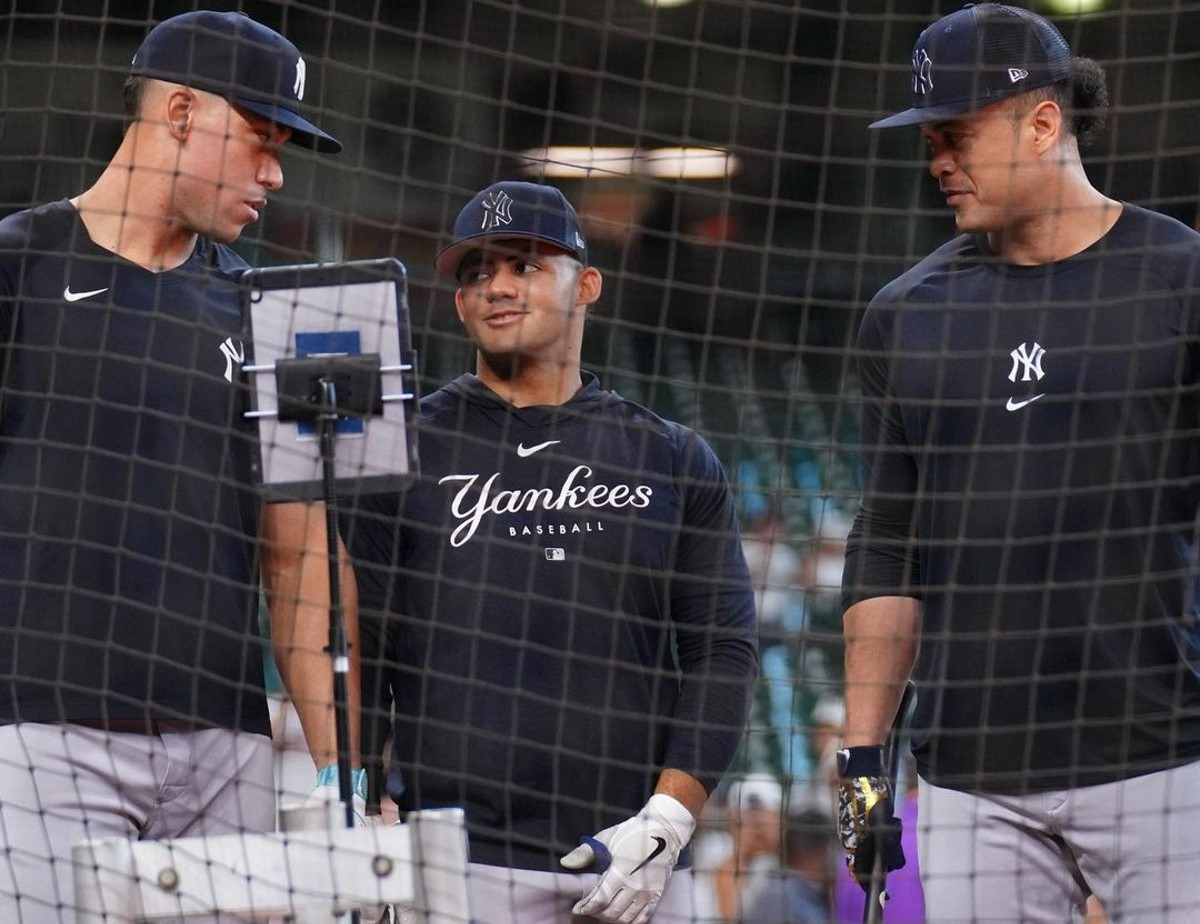Yankees get third highest MLB tax bill for 2023 season


Inna Zeyger
More Stories By Inna Zeyger
- Mother’s Day: How Anthony Volpe’s mom molded him into a Yankee phenom
- Juan Soto rumors ignite hope among Yankees fans eyeing championship future
- Yankees upgrade Juan Soto offer to $630M, pitch lucrative endorsement perks
- Who is Dave Sims, the one chosen to fill John Sterling’s big shoes at Yankees booth?
- Yankees weighing Alex Bregman pursuit as Juan Soto decision looms
Table of Contents
The New York Yankees are set to contribute tax payments to Major League Baseball for the second consecutive year, as reported by the Associated Press on Saturday. This amounts to a substantial sum of $32.3 million.
In the 2023 season, the Yankees ranked as the third-most taxed team in the Majors, facing a $32.4 million tax bill on their payroll, which was calculated at $280 million, according to Spotrac. Interestingly, within the city, they weren’t the team facing the highest tax burden. The New York Mets surpassed all teams not only in spending but also in shouldering the highest tax obligation, setting a record in the process.
The Mets recorded a taxable payroll of $374.7 million and a tax bill of $100.7 million, establishing new highs in both categories within MLB. In comparison, San Diego trails as a distant second with a tax payment of $39.6 million.
In 2023, the Yankees found themselves among the eight teams subject to payment beyond the Competitive Balance Tax, which operates on a four-tiered system aiming to levy teams surpassing a specified payroll threshold.
In the 2023 season, the set threshold stood at $233 million. , teams falling into the category of exceeding the limit faced a structured MLB luxury tax surcharge system, comprising four tiers:
- 20% surcharge if the total expenses are above $233 million but below $253 million.
- 32% surcharge if the total expenses are above $253 million but below $273 million.
- 62.5% surcharge if the total expenses are above $273 million but below $293 million.
- 80% surcharge if the total expenses are above $293 million.
These rates escalate for teams facing a second occurrence of surpassing the designated thresholds, including the New York Yankees.

Yankees among eight teams to pay taxes for the 2023 season
In total, eight teams were obligated to pay various tax amounts, collectively summing up to $209.8 million.
| Team | Total tax bill |
| New York Mets | $100,781,932 |
| San Diego Padres | $39,693,955 |
| New York Yankees | $32,399,366 |
| Los Angeles Dodgers | $19,423,297 |
| Philadelphia | $6,977,345 |
| Toronto Blue Jays | $5,535,452 |
| Atlanta Braves | $3,159,536 |
| Texas Rangers | $1,827,142 |
Other teams subjected to taxation included the San Diego Padres ($39.7 million), the Los Angeles Dodgers ($19.4 million), the Philadelphia Phillies ($6.98 million), the Toronto Blue Jays ($5.5 million), the Atlanta Braves ($3.2 million), and the Texas Rangers ($1.8 million).
Tax payrolls are determined by averaging annual values, which encompass earned bonuses, for players listed on 40-man rosters. Additionally, it incorporates slightly over $17.1 million per team allocated for benefits, along with $1.67 million designated for each club’s portion of the $50 million pool designated for pre-arbitration players, initiated in 2022. Deferred salaries and bonus payments are discounted to their present-day values.
Regular payrolls, contingent on 2023 salaries and earned bonuses, along with prorated shares of signing bonuses, have yet to be finalized by MLB.
The Padres and Dodgers, obligated to pay tax for the third consecutive year, face a tiered taxation structure. They incur a 50% rate on the initial $20 million above the $233 million threshold, a 62% rate on the subsequent $20 million, and a 95% rate on the amount ranging from $273 million to $293 million.

For the second consecutive year, the Mets, Yankees, and Phillies find themselves obligated to pay taxes, subject to a tiered system. They are levied at a rate of 30% on the initial $20 million over the threshold, 42% on the subsequent $20 million, 75% on the third $20 million, and 90% on any amount exceeding $293 million.
The allocation of the first $3.5 million of the tax funds is directed toward funding player benefits, while 50% of the remaining amount contributes to player Individual Retirement Accounts. The remaining 50% is designated for a supplemental commissioner’s discretionary fund, intended for distribution to teams that receive revenue-sharing money and have demonstrated growth in their non-media local revenue over several years.
Looking ahead to 2024, the Yankees seem to be in a favorable position. According to Spotrac, the team’s projected tax payroll stands at just $195 million, well below the 2024 threshold of $237 million. However, it’s worth noting that arbitration bills and other factors could potentially alter this financial landscape in the new year.
Mets paying a record million-plus for luxury tax
The New York Mets are facing an unprecedented luxury tax, reaching a record-breaking amount of nearly $101 million, a consequence of their fourth-place finish in the division. This places them among a unique set of eight teams that are subjected to this penalty for the 2023 season.
Owner Steve Cohen’s Mets concluded with a tax payroll totaling $374.7 million, according to figures officially released by Major League Baseball on Thursday and disclosed to The Associated Press. This figure surpassed the previous record of $291.1 million held by the 2015 Los Angeles Dodgers.

The Mets’ tax liability reached $100,781,932 after their fourth-place finish in the NL East with a 75-87 record, marking the most expensive underperformance in baseball history. This amount more than doubled the previous high of $43.6 million incurred by the 2015 Dodgers.
The Mets achieved savings of approximately $18 million for the current year through their strategic summer player transactions, which included trading Max Scherzer, Justin Verlander, David Robertson, and Mark Canha. As of June 30, their projected tax payroll stood at $384 million, as per MLB records. The additional $9.3 million in payroll would have incurred a tax liability $8.4 million higher.
While the final owed amount by the Mets would have been slightly more, they benefited from a tax credit of $2,126,471 under a provision in the latest collective bargaining agreement. This credit was related to a payroll overcharge involving three players they traded. The Mets’ cumulative tax payment over the two-year period now stands at $131.6 million.
Others
The count of taxpayers reached a new pinnacle this year, totaling eight, surpassing the previous highs of six in both 2016 and the preceding year. The 2023 tax sum amounted to $209.8 million, exceeding the prior record of $78.5 million established in 2022, more than doubling the figure.
The Los Angeles Angels narrowly avoided the tax threshold, concluding with a tax payroll that was $28,654 below the $233 million mark. Their projection on June 30 was $231.15 million, and they managed to fall under the threshold by allowing certain players, including pitchers Lucas Giolito, Matt Moore, Dominic Leone, and Reynaldo López, along with outfielder Hunter Renfroe, to be claimed off waivers on August 31.
Texas initially projected a payroll of $220.2 million on June 30, but they surpassed this figure by making strategic moves to bolster their pitching staff. This involved trading for players like Max Scherzer, Aroldis Chapman, Jordan Montgomery, and Chris Stratton, in addition to acquiring catcher Austin Hedges. Consequently, the Rangers’ final payroll stood at $242.1 million.
The overall expenditure on luxury tax payrolls increased by 12.2%, reaching a total of $5.79 billion, a notable rise from the previous high of $5.16 billion recorded last year.
Since the initiation of penalties in 2003, the Yankees have incurred just under $390 million in taxes, constituting 43% of the cumulative $901 million total. Following closely are the Dodgers, who have paid $234 million. Out of the 30 teams, fourteen have found themselves subject to tax over the span of two decades.
The Blue Jays, Braves, and Rangers find themselves in the position of paying tax for the first time.
Notably, the Yankees and Mets stand as the only teams to surpass the fourth threshold of $293 million, introduced in the 2022 labor contract and colloquially termed the Cohen Tax, designed to curb spending by Cohen. Payments are required to be settled by January 21.
What do you think? Leave your comment below.
- Categories: New York Yankees
- Tags: New York Yankees


 Follow Us
Follow Us









